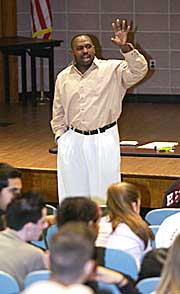|
This is an archived article.
For the latest news, go to the
Advance Homepage
For more archives, go to the Advance Archive/Search Page. | ||
|
Advocate For Diversity Urges Students Those who are opposed to racism and discrimination should take a stand that's as strong as that of their opponents, says a national expert on diversity issues.
"If we can hang people from trees, if we can put people in concentratio n camps, if we can drag people behind cars, why should I ever water down my program?" said Leon Williams, director of intercultural programs at Buena Vista University in Iowa, at the start of a presentation on diversity to an auditorium full of students at the Greater Hartford campus Nov. 18. The perpetrators of hate crimes "didn't drag for four minutes instead of 10, or hang slaves from trees for six minutes instead of an hour," he said. "They maximized their opportunities." The talk, which included a PowerPoint presentation of disturbing civil rights images, and small group discussions on how to promote diversity at home, was one of a series organized by the First Year Experience Program and Student Activities. Williams said that when he moved to Iowa there were just seven black people out of 10,000 in the community where he lives, and out of 1,200 students at Buena Vista University, only 15 were minorities. He said he took the job because he believes he can make a difference. Williams, who is African American, said stereotypes are the basis of racism and discrimination. He invited a young white woman from the audience to join him at the front of the auditorium. "Me and her are dating," he said, painting an imaginary scenario. "Now some people are going to draw the conclusion that black men are attracted to non-black women. They're going to call up someone, and they call someone else, and before you know it, it's spread to a generalization about all black men." Stereotypes lead to fear and anxiety, which lead to segregation and separation, he said. In another example, Williams recounted an incident after Sept. 11 when two men boarded an airplane wearing Middle Eastern dress and other passengers refused to get on the plane. He said their objections were based on a stereotype that people of Middle Eastern origin are terrorists. "Your attitude to 9/11 may cause you to be discriminatory," he said. He talked about how stereotypes are developed. "Parents are very influential in a child's life," he said. If a parent is driving, for example, and another driver cuts off the car and the parent says 'damn Mexicans,' the child hears that and starts making an association, he said. Even when a child is in its mother's womb, people are preparing its life based on stereotypes, Williams said. Boys' rooms are decorated blue and later they're filled with sports items, girls' rooms are painted pink, and have dolls and teddy bears. "These things around you, they become you," he said. Discrimination fundamentally affects people's lives, he said. At the heart of the issue of race is economics, the divide between 'the haves' and the 'have nots.' "The haves created the norms," Williams said. "In the development of this country, those individuals were white, while other folks - including women - performed cheap labor. You can't go back and erase the history that has brought us to this point." He said discrimination must be addressed by speaking out. "There's a lot of good people who watch other people's lives being destroyed. They'd rather walk away. They'd rather read the word on the door - faggot, gay, nigger, chink - and keep quiet. If you want to be an advocate for diversity, you've got to break the silence," he said. "You can't be cool when you're with this crowd, and then when you're over there, you're different" he added. Williams said sometimes students get tired of hearing about racism and diversity. "Step out of that state and get involved," he told the audience. "How many discriminatory jokes will you continue to pass through your e-mail? "You can't wait until there's an incident report, and then have a judicial hearing, develop a policy," he said. "You can't address discrimination ad hoc. "We need to be proactive," he added, "and take ownership of our community." |

